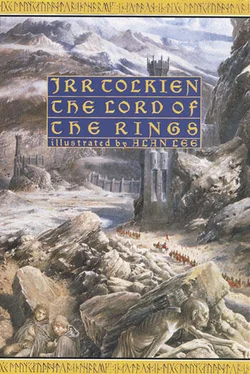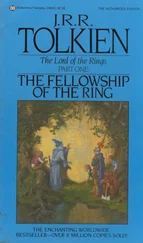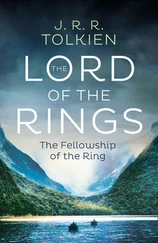1 ...5 6 7 9 10 11 ...363 There is another astonishing thing about Hobbits of old that must be mentioned, an astonishing habit: they imbibed or inhaled, through pipes of clay or wood, the smoke of the burning leaves of a herb, which they called pipe-weed or leaf, a variety probably of Nicotiana. A great deal of mystery surrounds the origin of this peculiar custom, or ‘art’ as the Hobbits preferred to call it. All that could be discovered about it in antiquity was put together by Meriadoc Brandybuck (later Master of Buckland), and since he and the tobacco of the Southfarthing play a part in the history that follows, his remarks in the introduction to his Herblore of the Shire may be quoted.
‘This,’ he says, ‘is the one art that we can certainly claim to be our own invention. When Hobbits first began to smoke is not known, all the legends and family histories take it for granted; for ages folk in the Shire smoked various herbs, some fouler, some sweeter. But all accounts agree that Tobold Hornblower of Longbottom in the Southfarthing first grew the true pipe-weed in his gardens in the days of Isengrim the Second, about the year 1070 of Shire-reckoning. The best home-grown still comes from that district, especially the varieties now known as Longbottom Leaf, Old Toby, and Southern Star.
‘How Old Toby came by the plant is not recorded, for to his dying day he would not tell. He knew much about herbs, but he was no traveller. It is said that in his youth he went often to Bree, though he certainly never went further from the Shire than that. It is thus quite possible that he learned of this plant in Bree, where now, at any rate, it grows well on the south slopes of the hill. The Bree-hobbits claim to have been the first actual smokers of the pipe-weed. They claim, of course, to have done everything before the people of the Shire, whom they refer to as “colonists”; but in this case their claim is, I think, likely to be true. And certainly it was from Bree that the art of smoking the genuine weed spread in the recent centuries among Dwarves and such other folk, Rangers, Wizards, or wanderers, as still passed to and fro through that ancient road-meeting. The home and centre of the art is thus to be found in the old inn of Bree, The Prancing Pony, that has been kept by the family of Butterbur from time beyond record.
‘All the same, observations that I have made on my own many journeys south have convinced me that the weed itself is not native to our parts of the world, but came northward from the lower Anduin, whither it was, I suspect, originally brought over Sea by the Men of Westernesse. It grows abundantly in Gondor, and there is richer and larger than in the North, where it is never found wild, and flourishes only in warm sheltered places like Longbottom. The Men of Gondor call it sweet galenas, and esteem it only for the fragrance of its flowers. From that land it must have been carried up the Greenway during the long centuries between the coming of Elendil and our own days. But even the Dúnedain of Gondor allow us this credit: Hobbits first put it into pipes. Not even the Wizards first thought of that before we did. Though one Wizard that I knew took up the art long ago, and became as skilful in it as in all other things that he put his mind to.’
3 Of the Ordering of the Shire
The Shire was divided into four quarters, the Farthings already referred to, North, South, East, and West; and these again each into a number of folklands, which still bore the names of some of the old leading families, although by the time of this history these names were no longer found only in their proper folklands. Nearly all Tooks still lived in the Tookland, but that was not true of many other families, such as the Bagginses or the Boffins. Outside the Farthings were the East and West Marches: the Buckland (p. 98); and the Westmarch added to the Shire in S.R. 1452.
The Shire at this time had hardly any ‘government’. Families for the most part managed their own affairs. Growing food and eating it occupied most of their time. In other matters they were, as a rule, generous and not greedy, but contented and moderate, so that estates, farms, workshops, and small trades tended to remain unchanged for generations.
There remained, of course, the ancient tradition concerning the high king at Fornost, or Norbury as they called it, away north of the Shire. But there had been no king for nearly a thousand years, and even the ruins of Kings’ Norbury were covered with grass. Yet the Hobbits still said of wild folk and wicked things (such as trolls) that they had not heard of the king. For they attributed to the king of old all their essential laws; and usually they kept the laws of free will, because they were The Rules (as they said), both ancient and just.
It is true that the Took family had long been pre-eminent; for the office of Thain had passed to them (from the Oldbucks) some centuries before, and the chief Took had borne that title ever since. The Thain was the master of the Shire-moot, and captain of the Shire-muster and the Hobbitry-in-arms; but as muster and moot were only held in times of emergency, which no longer occurred, the Thainship had ceased to be more than a nominal dignity. The Took family was still, indeed, accorded a special respect, for it remained both numerous and exceedingly wealthy, and was liable to produce in every generation strong characters of peculiar habits and even adventurous temperament. The latter qualities, however, were now rather tolerated (in the rich) than generally approved. The custom endured, nonetheless, of referring to the head of the family as The Took, and of adding to his name, if required, a number: such as Isengrim the Second, for instance.
The only real official in the Shire at this date was the Mayor of Michel Delving (or of the Shire), who was elected every seven years at the Free Fair on the White Downs at the Lithe, that is at Midsummer. As mayor almost his only duty was to preside at banquets, given on the Shire-holidays, which occurred at frequent intervals. But the offices of Postmaster and First Shirriff were attached to the mayoralty, so that he managed both the Messenger Service and the Watch. These were the only Shire-services, and the Messengers were the most numerous, and much the busier of the two. By no means all Hobbits were lettered, but those who were wrote constantly to all their friends (and a selection of their relations) who lived further off than an afternoon’s walk.
The Shirriffs was the name that the Hobbits gave to their police, or the nearest equivalent that they possessed. They had, of course, no uniforms (such things being quite unknown), only a feather in their caps; and they were in practice rather haywards than policemen, more concerned with the strayings of beasts than of people. There were in all the Shire only twelve of them, three in each Farthing, for Inside Work. A rather larger body, varying at need, was employed to ‘beat the bounds’, and to see that Outsiders of any kind, great or small, did not make themselves a nuisance.
At the time when this story begins the Bounders, as they were called, had been greatly increased. There were many reports and complaints of strange persons and creatures prowling about the borders, or over them: the first sign that all was not quite as it should be, and always had been except in tales and legends of long ago. Few heeded the sign, and not even Bilbo yet had any notion of what it portended. Sixty years had passed since he set out on his memorable journey, and he was old even for Hobbits, who reached a hundred as often as not; but much evidently still remained of the considerable wealth that he had brought back. How much or how little he revealed to no one, not even to Frodo his favourite ‘nephew’. And he still kept secret the ring that he had found.
Читать дальше
Конец ознакомительного отрывка
Купить книгу












